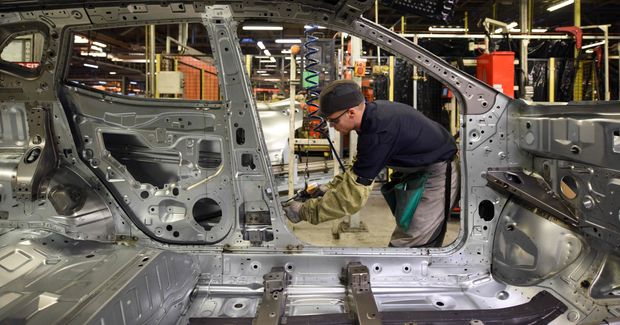
Nissan, Honda, Toyota, Aston Martin, Jaguar Land Rover, and Mini are among the car companies that manufacture vehicles in the U.K.
Oli Scarff/Agence France-Presse/Getty Images
Boris Johnson has released a plan to kick-start a new green economy in the U.K., including rapidly accelerating the transition to electric vehicles and transforming national infrastructure to support them.
The prime minister’s plan, confirmed on Wednesday, outlines the road map for a “Green Industrial Revolution” that will be backed by £12 billion ($15.9 billion) in public money, and potentially more than £36 billion in private funds, the government said.
The goal is to create 250,000 jobs by 2030, including 90,000 before the next national election expected in 2024, in renewable energy and green industries.
One of the key elements of the 10-point plan is to transform the U.K.’s automotive manufacturing sector, the fifth-largest in Europe, into an electric vehicle powerhouse.
Nissan 7201, -0.97%, Honda 7267, +0.25%, Toyota 7203, -0.24%, Aston Martin, Jaguar Land Rover (owned by India’s Tata Motors TTM, -0.43% ), and Mini (owned by BMW BMW, +0.17% ) are among the car companies that manufacture vehicles in the U.K.
Read this: Why this Tesla partner is betting big on the European electric-vehicle market
The plan aims to move up the U.K.’s transition to green mobility by ending the sale of new gasoline and diesel cars and vans by 2030, in favor of plug-in electric vehicles and full hybrids, with a transition to 100% zero-emissions vehicles by 2035.
The government previously planned to ban sales of new internal combustion engine vehicles by 2040, and in February Johnson bumped that deadline up to 2035.
Up to £1 billion will be earmarked for supporting the electrification of vehicles and supply chains, including the development of gigafactories to produce batteries.
The government will also spend £1.3 billion to build vehicle-charging infrastructure, and provide £582 million to extend grants to reduce the sticker price of plug-in cars, vans, taxis, and motorcycles.
Read more: Here are the companies set for growth from the boom in demand for e-bikes
Battery-powered electric vehicles made up 6.6% of all new vehicles purchased in the U.K. in October, but are on the rise — they made up just 2.2% of new vehicles purchased in the same month in 2019, according to data from the Society of Motor Manufacturers and Traders.
Meanwhile, sales of gasoline and diesel cars are falling, according to SMMT data, making up 64.4% of new vehicles purchased in October compared with 85.6% in 2019.
As an established and specialized manufacturer of electric vehicles with a growing sales presence in the U.K., Tesla TSLA, +2.59% could stand to benefit from Johnson’s new plan.
Tesla’s Model 3 is the bestselling electric car in the U.K., and, according to SMMT data, was the ninth most popular new car purchase in June across all vehicle types.
Harry Barnick, an analyst at Third Bridge, an investment research consulting firm, said that Johnson’s new strategy puts manufacturers a decade behind in developing and rolling out electric vehicles and hybrids for the British car market — the second largest in Europe, after Germany.
“Brands like Volkswagen, who have a healthy pipeline of electric vehicles are well positioned to benefit from this shift,” Barnick said. “In contrast, Renault, with its aging electric vehicles will have to aggressively rethink it is product strategy.”
Plus: Tesla gets big boost over plans for first European factory
Barnick also noted that the ultra-premium segment will be particularly set back, because they have been slower to develop electric and hybrid-electric vehicles.
“Brands like Aston Martin, who recently announced a suspension of its electrification strategy in light of COVID, will have to rethink the next 13 years,” Barnick said.
However, Barnick said that the policy’s extension of new sales for hybrid vehicles until 2035 “will be a lifeline for brands that are behind the pure-electric innovation curve.”
Johnson’s plan also includes broader implications for British energy and finance, including quadrupling the current offshore wind power production, focusing on low-carbon hydrogen production, and making the City of London the global center of green finance.
Oct. 2020: Boris Johnson in Bid to Make U.K. the ‘Saudi Arabia’ of Wind Power







